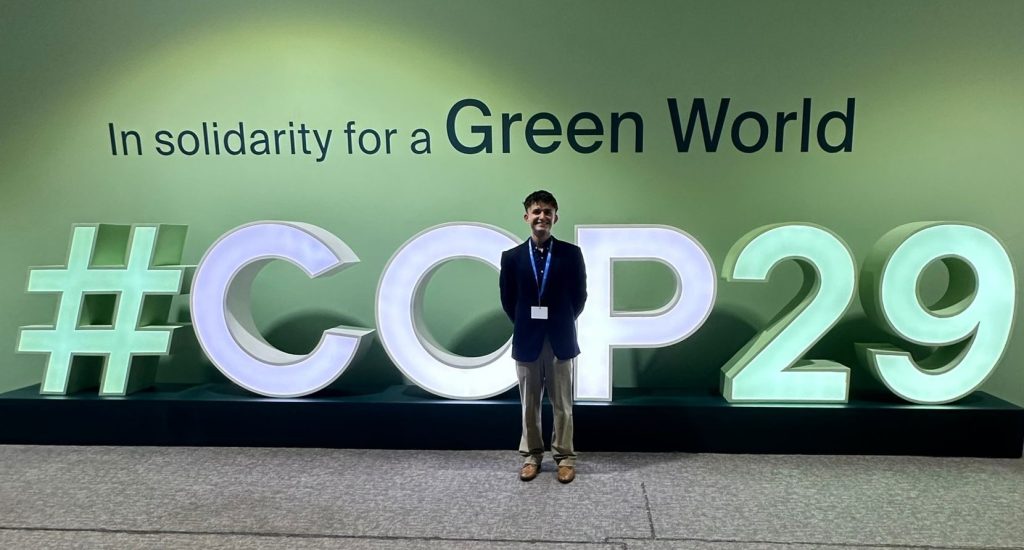
Written by Juan Garcia Valencia, PhD student with SCENARIO DTP, University of Reading.
Attending the 29th Conference of the Parties (COP29) in Baku was an eye-opening experience that allowed me to be at the frontline of collective action in addressing climate change. From learning more about global governance to forging meaningful connections, every moment at COP29 was an opportunity to grow personally and professionally. In this blog, I hope to share some of the reasons I applied to the COPCAS programme, the most surprising elements of the event, one of my favourite stories I heard, and some tips for those planning to attend future COPs.
My decision to apply for COP29 stemmed from a deep interest in the science-policy interface and a desire to contribute to meaningful climate action. As a PhD student researching monsoons and their variability with climate change, my work primarily involves analysing large datasets with the aim of crafting papers that can inform decision-making. While this scientific foundation is critical, I was eager to move beyond the confines of my computer screen and engage directly with the global climate community. The chance to communicate my research to key stakeholders and contribute to the heart of international climate discussions was an unparalleled opportunity. Moreover, having previously participated in COPCAS and closely followed COP events over the years, attending the conference in-person was the ideal next step in my climate-centred career. This experience promised not only professional growth but also the chance to see first-hand how research and advocacy converge on the global stage.
I had the privilege of attending the second week of COP29 — a critical stage of the conference when ministers delve into the intricate details of agreements shaped during the first week, striving to achieve a consensus by the end of the week. My time was primarily spent in the Blue Zone, immersing myself in a variety of events, including press conferences, side sessions, negotiation meetings, and high-stakes plenaries.
Each day began with the Research and Independent Non-Governmental Organisation (RINGO) constituency meetings, which proved invaluable in providing concise summaries of the previous day’s negotiation progress and highlighting key events to watch. These briefings not only set the tone for the day but also ensured I remained informed about the dynamic and fast-moving discussions. Throughout the week, I also stayed connected with peers at the Walker Institute, sharing insights and updates on the events I attended. This exchange of information fostered a collaborative environment and helped bridge the gap between on-the-ground developments at COP29 and the wider academic community back home.
Experiencing the event first-hand revealed surprises that expanded my understanding of its scope and complexity. Firstly, the sheer scale of the conference, both in terms of its physical size and the number of simultaneous events, was staggering. It quickly became evident that attending everything was impossible, so instead I focused on the topics I was most interested in. I also gained a newfound appreciation for the host country’s role in orchestrating such a massive event, which demands extraordinary coordination, from organising transport systems to mobilising a vast network of volunteers. Equally striking was the incredible diversity of attendees, showcasing the universal impact of climate change and the essential need for broad representation in climate discussions. Among the most inspiring aspects was the strong presence of young people and activists, whose energy and commitment highlighted the vital role of the next generation in driving meaningful climate action.
Named the Finance COP, a key outcome of this year’s conference was the agreement on the New Collective Quantified Goal (NCQG) for climate finance. Attending these negotiations in person was fascinating, offering a first-hand look at how even minor details, like a comma, can stall progress if countries disagree. I particularly enjoyed talking with attendees both in the audience or in queues as I learnt about unique perspectives on issues and shared updates, deepening my understanding of how global governance, diplomacy, and environmental policy intersect. I also learned about “inf-infs,” informal sessions designed to speed up agreements by addressing contentious issues directly. Despite the lengthy discussions, the final figure fell short of developing nations’ demands. This further highlighted to me the ongoing disparities in climate finance commitments and the need for more equitable solutions
Among the many incredible individuals I met, my interaction with two indigenous women from Chile left a profound impact. Their presentation on the consequences of lithium extraction in the Atacama Desert was both heart-breaking and inspiring. They spoke passionately about the devastating effects of privatized water and mineral resources, which have left their communities struggling with water scarcity and ecological exhaustion. Their unwavering determination to fight for their rights and protect their environment, despite significant challenges, was a powerful reminder of the human cost of unsustainable practices. Their story underscored the importance of amplifying marginalized voices in global climate discussions.
Since returning, I’ve had the opportunity to share my COP29 insights with peers, the Walker Institute, and other groups across the university, including the National Centre for Atmospheric Science (NCAS). These presentations have highlighted the immense value of attending the conference in person. The rapid learning, exposure to global perspectives, and direct engagement with diverse experts have not only deepened my understanding but also renewed my motivation to complete my PhD and continue contributing to the climate field. The experience also proved to be a valuable opportunity for personal and professional growth. I honed essential skills such as communication, time management, and networking, all of which will serve me well in future endeavours within the climate sphere.
A heartfelt thank you to Walker Institute and the University of Reading for their support in making this experience possible. Attending COP29 in person was a transformative journey that deepened my commitment to climate action and inspired me to continue advocating for a sustainable future.

